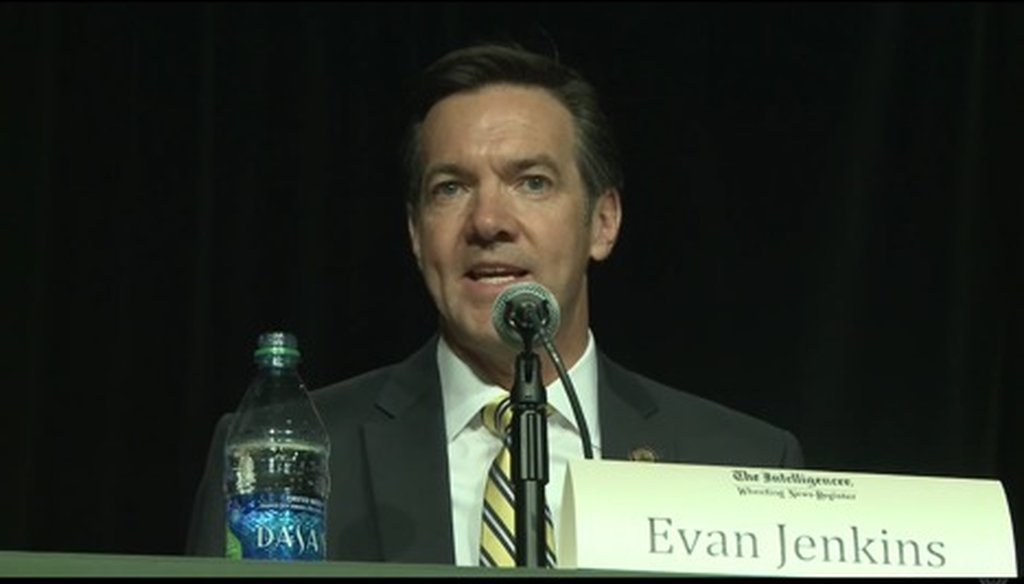



Rep. Evan Jenkins, R-W.Va., was one of several U.S. Senate primary candidates who appeared at a Republican debate on April 23, 2018.
The Environmental Protection Agency is not very popular among West Virginia Republicans, who see the agency as threatening the state’s mining jobs through overregulation -- at least until President Donald Trump took office.
So, during an April 23 debate between Republican primary candidates for a U.S. Senate seat, it was not surprising to hear the agency criticized.
One of the candidates, U.S. Rep. Evan Jenkins, boasted about his efforts to rein in the agency. "I’ve cut a half a billion (dollars) out of the EPA just in the last two years. We’ve cut 3,000 jobs out of the EPA," he said. (It’s around 29:30 in the video.)
We’ll look at the two parts of this statement separately -- first, the agency’s budget, and second, its employment level.
Jenkins would have been more accurate if he’d said "we’ve" cut half a billion dollars, as he did in the second part of his statement. Obviously, in our constitutional system of checks and balances, individual U.S. House members cannot cut an agency’s budget on their own.
On the more substantive question, however, Jenkins was on target. In fact, he lowballed it a little.
Historical data from the Office of Management and Budget, shows spending by the EPA at $8.725 billion in 2016; $8.165 billion in 2017; and an estimated $7.916 billion in 2018.
The two-year difference between 2016 and 2018 is $809 million, which is more than half a billion dollars, or a 9.2 percent reduction over that two-year span.
The actual amount allowed by the omnibus spending bill passed after OMB made its estimate is slightly higher for 2018 -- $8.058 billion. But even at that higher level, the two-year decrease exceeds the half-billion-dollar figure Jenkins cited.
Here’s a chart showing EPA’s budget going back to 2009:
So Jenkins’ budget number appears solid.
For employment, we used a data tool created by the federal Office of Management and Budget called FedScope, which federal employment gurus consider the most accurate information available. FedScope provides detailed employment data on a quarterly basis; the most recent quarter available at the time of Jenkins’ comment was September 2017.
For simplicity, we took note of EPA employment in September of every year. In September 2015, EPA employed 15,445 people; in September 2016, it employed 15,634; and in September 2017, it employed 15,058.
Over this two-year period, EPA employment fell by 387 people -- well short of the 3,000 Jenkins cited.
The only way you can achieve a decrease of 3,000 EPA employees is by comparing the September 2017 level to the September 2012 level -- a five-year period that started before Jenkins was even in Congress.
Moreover, EPA employment in 2012 was boosted by spending through the American Recovery and Reinvestment Act -- more commonly known as the stimulus bill signed by President Barack Obama. So a chunk of the jobs lost since then were always intended to be temporary.
This chart shows EPA employment every September going back to 2009, according to FedScope:
When we asked the Partnership for Public Service, a group that studies federal employment, to look at our math, they agreed that it was accurate.
Jenkins’ campaign said the candidate was referring to a news release from the House Appropriations Committee that mentioned a decline of 3,106 jobs at the EPA since 2010 -- a longer period than a listener would have assumed hearing Jenkins’ comments at the debate.
When more recent data is released, it may show additional decreases in employment at EPA. An EPA plan for a government shutdown in December 2017 said the agency had a staff of 14,449, which was down from the prior shutdown plan in April, which cited a staff size of 15,219, according to the liberal website ThinkProgress.
That’s a decline of 770, but it’s still not as high as the 3,000 Jenkins noted.
Jenkins said, "I’ve cut a half a billion (dollars) out of the EPA just in the last two years. We’ve cut 3,000 jobs out of the EPA."
Setting aside his choice of "I" rather than "we," Jenkins has a point about the decrease in the EPA’s budget; in anything, his estimate is actually low. On employment, though, 3,000 jobs shed is an overzealous estimate. To get a number that large, you have to go back at least to 2012, before Jenkins was in Congress.
We rate the statement Mostly True.
Republican U.S. Senate primary debate, video, April 23, 2018
House Appropriations Committee, "Fiscal Year 2018 Interior and Environment Bill," March 21, 2018
Office of Management and Budget, Table 4.1—Outlays by Agency: 1962–2023, accessed April 25, 2018
Office of Personnel Management, FedScope main page, accessed April 25, 2018
Reuters, "EPA workforce shrinking to Reagan-era levels — agency official," Sept. 27, 2017
ThinkProgress, "More than 700 employees have left the EPA since Scott Pruitt took over," Dec,14, 2017,
Email interview with Erika Walter, press secretary for the Partnership for Public Service, April 25, 2018
Email interview with Steve Ellis, vice president of Taxpayers for Common Sense, April 25, 2018
Email interview with Andy Seré, spokesman for Evan Jenkins, April 25, 2018
In a world of wild talk and fake news, help us stand up for the facts.
